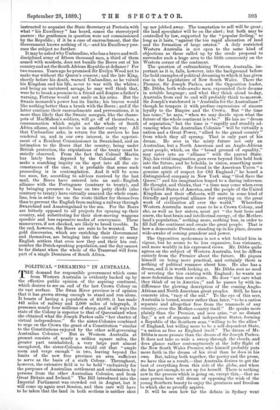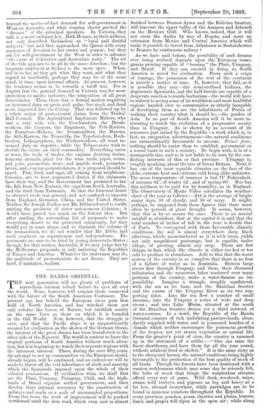POLITICAL " DREAMING " IN AUSTRALIA.
THE demand for responsible government which came from Western Australia is evidently backed up by the effective public opinion of the aspiring continent, which desires to see an end of the last Crown Colony on its vast surface. The Swan River province is of opinion that it has grown strong enough to stand and run alone. It boasts of having a population of 43,000, it has made 441 miles of railway and 2,000 miles of telegraph, it possesses nearly four millions of sheep, and in all ways the state of the Colony is superior to that of Queensland when she obtained what Sir Joseph Parkes calls " her charter of virtual independence." So the sister-Colonies combined to urge on the Crown the grant of a Constitution " similar to the Constitutions enjoyed by the other self-governing Australian Colonies." But as Western Australia at present consists of nearly a million square miles, the greater part uninhabited, a very large part almost unexplored, the sister-Colonies would cut that " ample room and verge enough " in two, leaving beyond the limits of the new free province an area sufficient to serve as the basis of a sixth Colony. Throughout, however, the extensive field is to be held "exclusively for the purposes of Australian settlement and colonisation by persons from the other Australian Colonies, and from Great Britain and Ireland." The Bill introduced into the Imperial Parliament was crowded out in August, but it will come up again next Session, and then care will have to be taken that the land in both sections is neither shut up nor jobbed away. The temptation to sell will be great ; the land speculator will be on the alert ; but both may be controlled by law, supported by the "popular feeling," so long as it lasts, " against the too rapid alienation of land and the formation of large estates." A duly restricted Western Australia is not open to the same kind of objections as those called up by the crude proposal to surrender such a huge area to the little community on the Western corner of the continent.
The question of enfranchising Western Australia, im- portant as it is, falls, however, into the background before the bold examples of political dreaming to which it has given rise in the Legislature of New South Wales. There the Premier, Sir Joseph Parkes, and the Opposition leader, Mr. Dibbs, both wide-awake men, expounded their dreams in notable language ; and what they think aloud to-day, Australia from end to end will probably think to-morrow. Sir Joseph's watchword is "Australia for the Australians I" though he tempers it with profuse expressions of sincere loyalty to the Empire and the Crown. But " the time has come," he says, " when we may decide upon what the future of the whole continent is to be." He has no " dream of separation," but the time is "rapidly and steadily ad- vancing when the Australian Colonies " will be virtually a nation and a Great Power, " allied to the grand country " from which they all sprung. That is only part of his dream. He sees in the misty future not only an Australian, but a North American and an Anglo-African great people, which, on the " broad ground of equality," may enter into an " alliance " with the parent State. Nay, his vivid imagination goes even beyond this bold look into the future, and he beholds, in vision, something more vast and attractive. He found in the American Union " a genuine spirit of respect for Old England ;" he heard a distinguished company in New York sing " God Save the Queen !" and his imagination leaped to a daring inference. He thought, and thinks, that " a time may come when even the 'United States of America, and the people of the United Kingdom and their offshoots, will unite in some kind of friendly and perpetual alliance for carrying on the great work of civilisation all over the world." Wherefore Western Australia must cease to be a Crown Colony, and she, as well as her sisters, must get " the best bone and sinew, the best brain and intellectual energy, of the Mother- land's population," nothing more, nothing less, in order to fill full the continent and create the great people. That is how a democratic Premier, standing up in his place, dreams wide-awake of coming grandeur and power.
The Opposition spokesman is not a whit behind him in vigour, but he seems to be less expansive, less visionary, and more worldly in his expressed views. Mr. Dibbs quite agrees on the subject of Western Australia, but he differs entirely from the Premier about the future. He piques himself on being more practical, and certainly there is nothing of political romance about him. He also has a dream, and it is worth looking at. Mr. Dibbs sees no need of severing the ties existing with England ; he wants no more federation than now exists. He does "not care what they think of us in America ;" and he passes by with in- difference the glowing description of the coming Anglo- African and North American great peoples. Still, he has a concrete idea, "racy of the soil." To the eye of this seer, Australia is bound, sooner rather than later, " to be a nation separate and altogether free from the trammels of any country, even the Mother-country itself." He speaks more plainly than the Premier, and sees arise, " at no distant day," a set of separate and independent States, forming a Republic of the Southern seas, " willing to be the allies " of England, but willing more to be a self-dependent State, "a nation as free as England itself." The dream of Mr. Dibbs is more prosaic than the dream of Sir Joseph Parkes. It does not take so wide a sweep through the clouds, and does glance rather contemptuously at the lofty flight of the New South Wales Premier, who himself probably puts more faith in the dream of his rival than he does in his own. But, taking both together, the poetry and the prose, we have this as a result,—that Australia desires to get the best of everything from this side of the globe, and when she has got enough, to set up for herself. There is nothing new in the process which is going on, except this,-.—that no sane person here will dream of opposing the wish of the young Southern beauty to enjoy the greatness and freedom to which she so proudly aspires.
It will be seen how far the debate in Sydney went beyond the matter-of-fact demand for self-government in Western Australia, and what rousing cheers greeted the " dreams " of the principal speakers. In Victoria, they talk in a more ordinary key. Both Houses, in their address, not only described themselves as " loyal and dutiful subjects," but said they approached the Queen with every assurance of devotion to her crown and person ; but they ask for self-government in the West in order to advance " the cause of federation and Australian unity." The set of the tide appears to be all in the same direction ; but the language employed at Sydney is the more open. When, and in so far, as they get what they want, and what they regard as inevitable, perhaps they may be of the same mind, in time, upon internal affairs. At present, however, the tendency seems to be towards a tariff war. For in August last the general demand in Victoria was for more protection to native industry, the temptation of all great democracies. Thus, there was a formal motion requiring an increased duty on grain and pulse, live stock and dead meat, imported into the Colony. That was followed up by a whole series of protectionist claims from the Trades' Hall Council. The Agricultural Implement Makers, who cast a very wide net, the Coachmakers, the Brush- workers, the Coopers, the Engineers, the Felt-Hatters, the Furniture-Makers, the Ironmoulders, the Masons, the Silk-Hatters, the Tinsmiths, the Typefounders, Book- binders, Lithographers, the Wickerworkers, all want in- creased duty on imports ; while the Tobacconists wish to abolish the excise on their commodity. Everything eaten or worn, the tools of trades, the engines drawing trains, domestic utensils, plant for the wine trade, pipes, ovens, and pots, gas-meters, stone and marble work, perambu- lators, and even toy-perambulators, it is proposed should be taxed. Fish, fruit, and eggs, all coming from neighbour- Colonies, are to bear augment€d duties if the claimants have their way, and the Government has promised to tax the fish from New Zealand, the eggs from South Australia, and the fruit from Tasmania. So that the fraternal desire to obstruct trade was general, and not confined to imports from England, Germany, China, and the United States. Neither Sir Joseph Parkes nor Mr. Dibbs referred to tariffs smiting the products of sister autonomous Colonies ; it would have jarred too much on the federal idea. But after reading the astounding list of proposals to make everything dearer to the protected community, for they would pay in some shape, and to diminish the volume of its transactions, we do not wonder that Mr. Dibbs laid such emphasis on separateness and independence. Ex- periments are sure to be tried by young democratic States ; though, for that matter, Australia, if we may judge her by the Melbourne proposals, is only imitating the Republics of France and America. Whatever the statesmen may do, the multitude of protectionists do not dream. They are hard, if mistaken, realists.







































 Previous page
Previous page